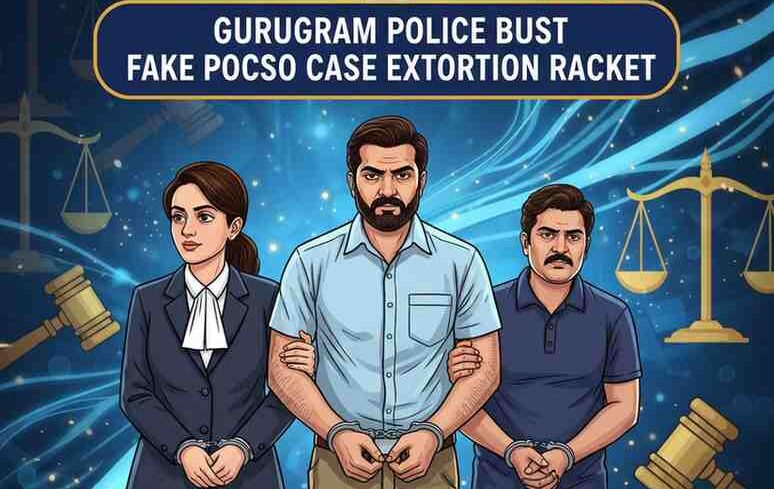Gurugram Police dismantled an extortion racket led by a lawyer, her husband, and an accomplice who filed fake POCSO cases using forged documents to blackmail victims for money. Learn about their operation, legal implications, and preventive measures.
Overview of the Case
The Gurugram Police have arrested a lawyer, her husband, and one associate for orchestrating a fraudulent operation involving fake cases under the Protection of Children from Sexual Offences Act (POCSO), 2012. The accused allegedly fabricated complaints using forged identity documents to extort large sums of money from innocent men.
During the raid, authorities recovered approximately ₹1.14 crore in cash, ₹2.88 crore worth of jewellery, forged identification documents, fake SIM cards, and multiple electronic devices. The police believe the accused had been running this operation for a considerable time, targeting individuals through false accusations.
How the Racket Operated
Identifying Targets
The accused primarily targeted men who were perceived as vulnerable or financially capable. They used false identities to establish contact and create situations that could be misrepresented as criminal in nature.
Filing False Complaints
Once contact was established, the group used forged Aadhaar cards and fabricated details to file POCSO complaints, alleging serious offences. These complaints were designed to appear legitimate, taking advantage of the strict provisions of the POCSO Act.
Demanding Money for Withdrawal
After filing the false cases, the accused contacted the victims and offered to withdraw the complaint in exchange for large payments. Fear of legal and social consequences made many victims agree to pay, which allowed the group to extort significant sums.
Concealing the Profits
The investigation revealed substantial assets accumulated through these illegal activities. Police found unaccounted cash, jewellery, and multiple digital devices used for coordination and record-keeping.
Legal and Social Consequences
The POCSO Act is a stringent law intended to protect children from sexual offences. Misusing it for extortion not only harms innocent individuals but also damages public trust in the justice system. Such actions also undermine the credibility of genuine victims, making legitimate cases harder to pursue.
The involvement of a practising lawyer in the racket raises concerns about the abuse of professional authority and misuse of legal knowledge. Authorities have stressed that any misuse of protective laws will be treated as a grave offence under the Indian Penal Code (IPC).
Police Investigation and Future Action
Following the arrests, the Gurugram Police formed a Special Investigation Team (SIT) to examine the extent of the racket. The team is reviewing digital evidence, tracing financial transactions, and identifying other potential victims. Forensic experts are also verifying the authenticity of documents and SIM cards seized from the suspects.
Police officials confirmed that further arrests are likely as the investigation progresses. The accused have been charged under sections related to cheating, forgery, criminal conspiracy, and extortion.
Public Awareness and Precautionary Measures
- Always verify the authenticity of any legal notice or police complaint received.
- Do not agree to any “settlement” or monetary demand outside court procedures.
- Keep a record of all communication and approach the authorities immediately if extortion is suspected.
- Seek professional legal assistance from a verified lawyer before responding to allegations.
- Report false or suspicious complaints to law enforcement for proper investigation.
FAQs: Gurugram Police Bust Fake POCSO Case Extortion Racket
What is the POCSO Act?
The Protection of Children from Sexual Offences (POCSO) Act, 2012, protects minors from sexual crimes. It mandates stringent punishment and confidentiality during trials.
How was the law misused in this case?
The accused filed fabricated POCSO complaints using false identities and then demanded money from the victims to withdraw the case.
What charges are the accused facing?
They face charges under IPC sections related to forgery, criminal conspiracy, cheating, and extortion, in addition to misuse of the POCSO Act.

























